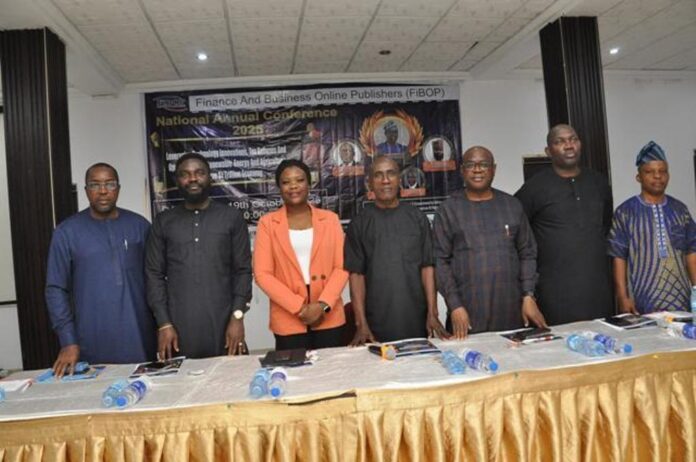
Stakeholders have identified infrastructure, development in agriculture, power supply, telecommunications, education, youth entrepreneurship, and support for small and medium-sized enterprises (SMEs) among others as essential pillars to help Nigeria achieve the $1 trillion economy by 2030.
They made the observations at the 2025 National Conference of the Finance and Business Online Publishers Association (FiBOP) held in Lagos under the theme ‘Leveraging technology innovations, tax reforms and opportunities in renewable energy and agriculture to achieve one trillion dollar economy,”
Speaking on the panel session, the managing director and chief executive officer of Tangerine General Insurance Company Limited, Mr Ademayowa Adeduro, emphasised that meaningful economic growth is impossible without significant investment in physical and digital infrastructure.
“Infrastructure is the foundation on which every other sector thrives. If we fix our roads, power, and communication systems, we will unlock new levels of productivity across agriculture, manufacturing, and services,” he said.
In his contribution, the executive technical director at emPLE Life Assurance Limited, Mr Jolaolu Fakoya, who represented the company’s managing director and chief executive officer, Mr Rantimi Ogunleye, also noted that Nigeria’s agricultural sector holds vast potential to drive inclusive growth and job creation.
“Beyond food security, agriculture can become a major source of export revenue if supported with the right financing, mechanization, and logistics infrastructure,” Fakoya said and called for stronger public-private partnerships and increased access to insurance for rural farmers.
For his part, the head, corporate communications at Rex Insurance Limited, Mr Wilson Esene-Okoh, who represented the managing director and chief executive officer, Mrs Ebelechukwu Nwachukwu, called for urgent reforms in the power sector.
“No economy,” she said, “can thrive in darkness. Nigeria’s industrial growth is severely limited by unreliable electricity. Investment in renewable energy and mini-grid solutions, especially for rural areas, will open up new economic frontiers.”
Also speaking, the manager, Nigerian Agricultural Insurance Corporation (NAIC), Lagos Branch, Mr Titiloye Oyatolu, who represented the managing director and chief executive officer, Mr Yazid Danfulani, highlighted the importance of de-risking agricultural investment through insurance.
He noted that climate-related risks and market volatility continue to discourage private sector involvement in agriculture, which remains Nigeria’s largest employer.
“Agricultural insurance must be expanded and made more accessible to enhance resilience and productivity in the sector,” he said.
Telecommunications and digital technology were also spotlighted as key enablers of economic growth. The panelists so agreed that with over 150 million internet users, Nigeria is uniquely positioned to benefit from the digital economy.
They said investments in broadband infrastructure, mobile technology, and fintech innovation are crucial to improving financial inclusion, expanding market access for SMEs, and driving productivity across industries.
On human capital development, the speakers stressed the need to reform the education sector to equip Nigeria’s youth with the skills required for a modern economy.
They highlighted the growing mismatch between graduates and available jobs, and the urgency of strengthening technical and vocational education.
“Youth entrepreneurship must be intentionally nurtured. Government and the private sector must collaborate to create an ecosystem that supports innovation, startup funding, and skills development,” Adeduro added.
SMEs, which account for a significant portion of Nigeria’s GDP and employment, were also identified as critical to achieving sustainable economic growth.
Besides, the discussants called for reduced regulatory bottlenecks, better access to finance and tax incentives for small businesses.
“The success of SMEs will determine how inclusive and resilient our economic growth will be,” Fakoya said.
The panelists urged the government to remain focused on reforming critical sectors, removing barriers to investment, and empowering the private sector to drive inclusive and sustainable economic growth.






















































